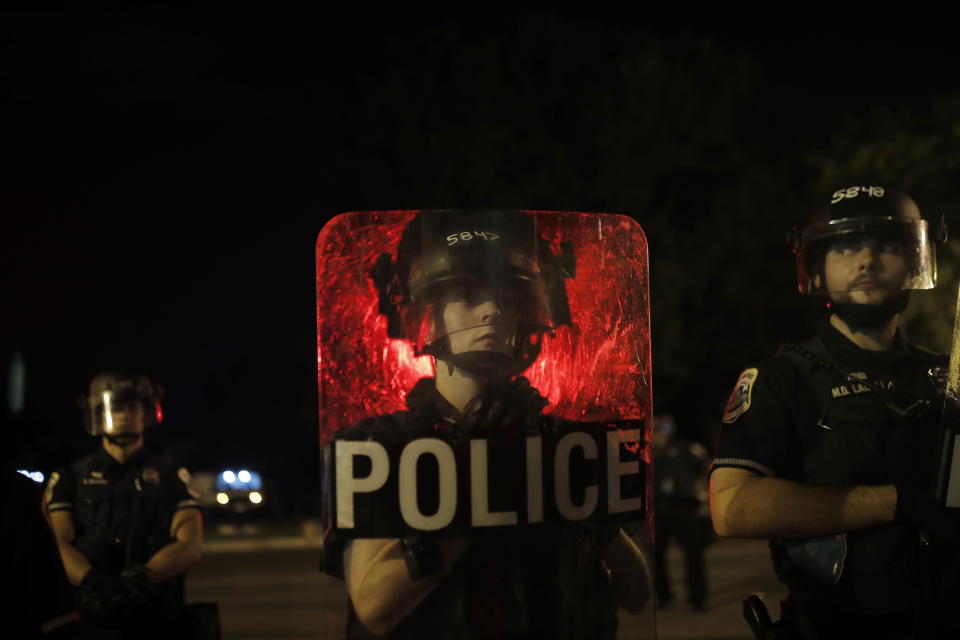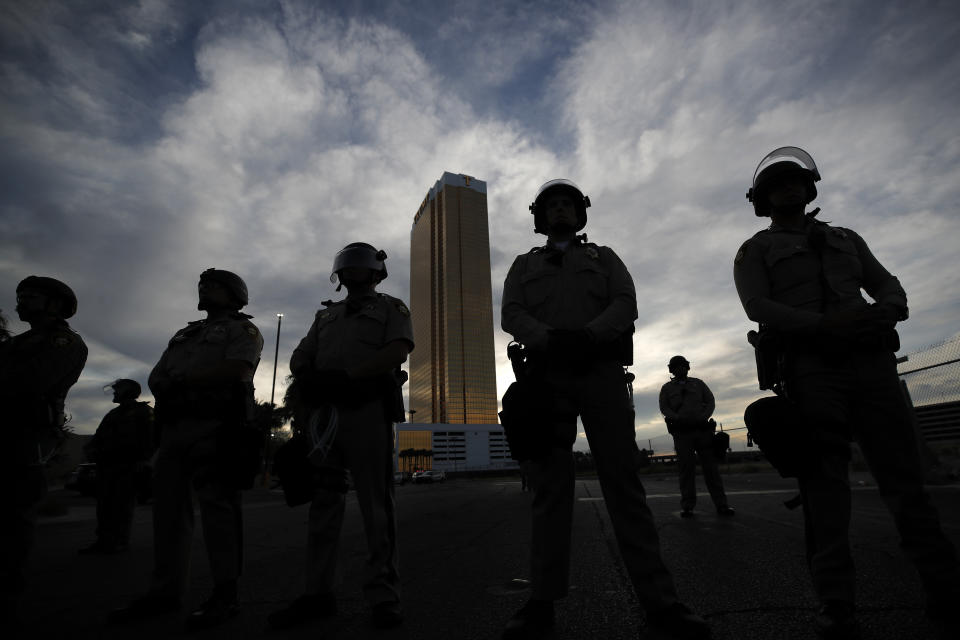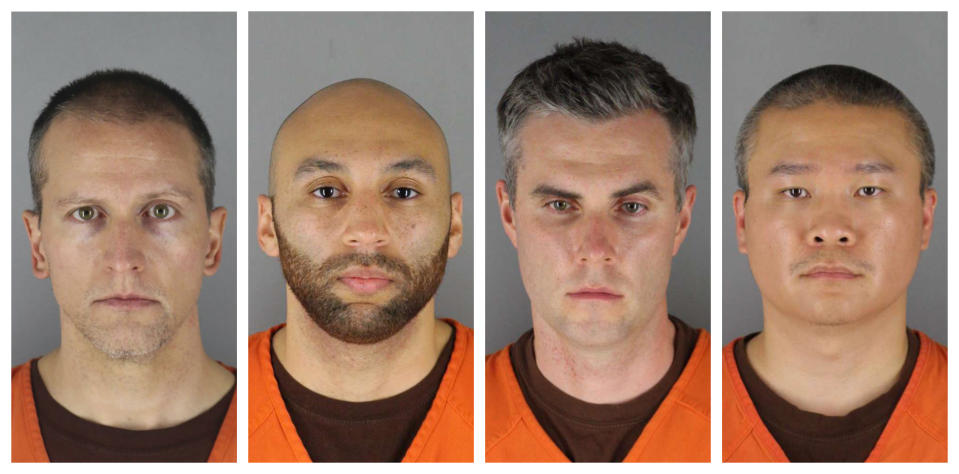Floyd's death spurs push to train cops to stop police abuse
HARTFORD, Conn. (AP) — Despite policies on the books for years that require officers across the United States to stop colleagues from using excessive force, there has been little or no effort to teach officers how to intervene, law enforcement officials and experts say.
That's now changing following the killing of George Floyd, who died after a white Minneapolis police officer held a knee to Floyd's neck for nearly eight minutes while three colleagues watched. Police departments nationwide are showing new interest in training officers how they should stop, or try to stop, abuse in their own ranks.
“I don’t think departments have prepared their officers sufficiently to deal with that sort of situation,” said Chuck Wexler, executive director of the Police Executive Research Forum, a Washington-based think tank. “Have we really thought through what that actually means, what’s actually expected of them? ‘Duty to intervene’ has to mean more than words. It has to mean actions.”
Officials in New Orleans, which has what many consider to be the nation’s model police peer intervention program, say that since Floyd's death in May, they have received more than 100 inquiries from police departments seeking information about their specialized training
Baltimore's police department, led by former New Orleans Police Superintendent Michael Harrison, is putting i9n place similar peer intervention training, as are the Philadelphia police and several other departments.
Minneapolis adopted a policy in 2016 requiring officers to intervene when colleagues are using inappropriate force. Yet three other officers at the scene failed to stop 19-year police veteran Derek Chauvin when he put his knee on Floyd's neck despite Floyd's cries that he could not breathe .
Chauvin is charged with second-degree murder, third-degree murder and manslaughter. The three other officers — two of whom say they voiced concerns to Chauvin — are charged with aiding and abetting.
In New Orleans, all officers have to take the peer intervention training, called Ethical Policing Is Courageous, or EPIC. They are put through a variety of scenarios in which they are taught different ways to verbally intervene, then physically intervene if needed, and how to respond when they themselves are the target of the intervention.
“Almost all situations are not going to be like the one in Minnesota where you actually have to physically remove somebody,” said Chief Deputy Superintendent Paul Noel. “Most of the interventions that we’re talking about are going to be verbal.”
Floyd’s death spurred nationwide protests and prompted many places to consider policing changes. Dallas, Charlotte, North Carolina, and Louisville, Kentucky, are among the cities that have implemented duty to intervene policies in recent months. Connecticut recently passed a wide-ranging police law that includes a statewide duty to intervene.
“These reforms are long overdue," Gov. Ned Lamont, D-Conn., said after signing the bill into law.
The duty to intervene is not a new concept. There were calls for requiring officers to stop inappropriate use of force after the beating of Rodney King by Los Angeles police in 1991 as many officers looked on. Similar calls came after Eric Garner died in 2014 when a New York City officer put him in a chokehold with other officers present.
New York City has had an intervention policy since 2016. Los Angeles has had a policy for years requiring officers to stop others from committing misconduct, but officials are now updating it to specifically include excessive force.
Court rulings, some dating to the early 1970s, have said officers are required to intervene when colleagues are violating people’s civil rights.
But the culture at many departments may look down at officers who intervene and lead to retaliation against them, and that has been an obstacle to duty to intervene policies, said Jon Blum, a law enforcement consultant and former police officer.
“Having a policy in place is great, but to a degree it can be window dressing,” said Blum, who was North Carolina’s statewide police training director in the late 1990s and early 2000s. “Policy does not necessarily change the culture of an organization or the culture of what officers are doing. I think it comes down to training.”
In 2008, Buffalo, New York police officer Cariol Horne was fired for interfering with another officer who she said was choking a handcuffed suspect. When she yelled at Officer Gregory Kwiatkowski and grabbed his arm during the 2006 incident, he responded by punching her in the face, she said.
An arbitration process determined she put the lives of the officers at the scene in danger, and she lost her appeals of her firing. Buffalo officials recently asked New York’s attorney general to review the case.
In New Orleans, calls for change came more than a decade ago in response to deadly incidents against unarmed civilians following Hurricane Katrina in 2005. The police department remains under a consent decree with the U.S. Justice Department that resolved allegations of unconstitutional conduct and ordered an overhaul.
Noel, the New Orleans chief deputy police superintendent, said there was a lot of skepticism within the department when officials launched the peer intervention program in 2016.
“As it was unveiled, more and more people saw how important this was and eventually we were able to get our department on board,” he said. “Our organization didn’t have the best reputation about seven to 10 years ago. We’ve been working really hard to change the culture of our organization and this has been a major piece of that.”
Los Angeles police officers credit the agency's duty to intervene policy and training along with other changes to contributing to a 30-year low in officer-involved shootings last year.
The labor union that represents city officers believes the duty to intervene should be a national policy, Los Angeles Police Protective League Spokesman Tom Saggau said.
“We saw firsthand one of the most egregious examples in Minneapolis that any of us have ever seen, where officers should have intervened. There’s an absolute duty to intercede,” he said.




